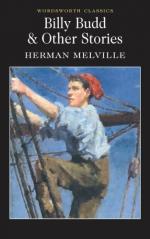|
This section contains 1,542 words (approx. 6 pages at 300 words per page) |

|
SOURCE: “Final Flowering,” in Herman Melville, Twayne Publishers, 1979, pp. 141–44.
In the following excerpt, Hillway discusses Melville's philosophical, religious, and scientific views and their impact on Billy Budd.
Billy Budd comes close to being Melville's “Everlasting Yea,” though the affirmation is oblique, not positive. In Mardi Melville considered and rejected various creeds, philosophies, and political and social theories in the search for truth; although he offered primitive Christianity as a social ideal and safe refuge for those willing to forego the quest of the absolute. Moby-Dick, while Promethean in certain respects, makes plain the folly of a stubborn defiance of man's fate. Pierre defines man's helplessness in the search for the meaning of true virtue and his inability to understand fully even himself. In Clarel the arguments for blind faith are tediously reviewed and one by one rejected, but the impression is conveyed that even in a state of...
|
This section contains 1,542 words (approx. 6 pages at 300 words per page) |

|


